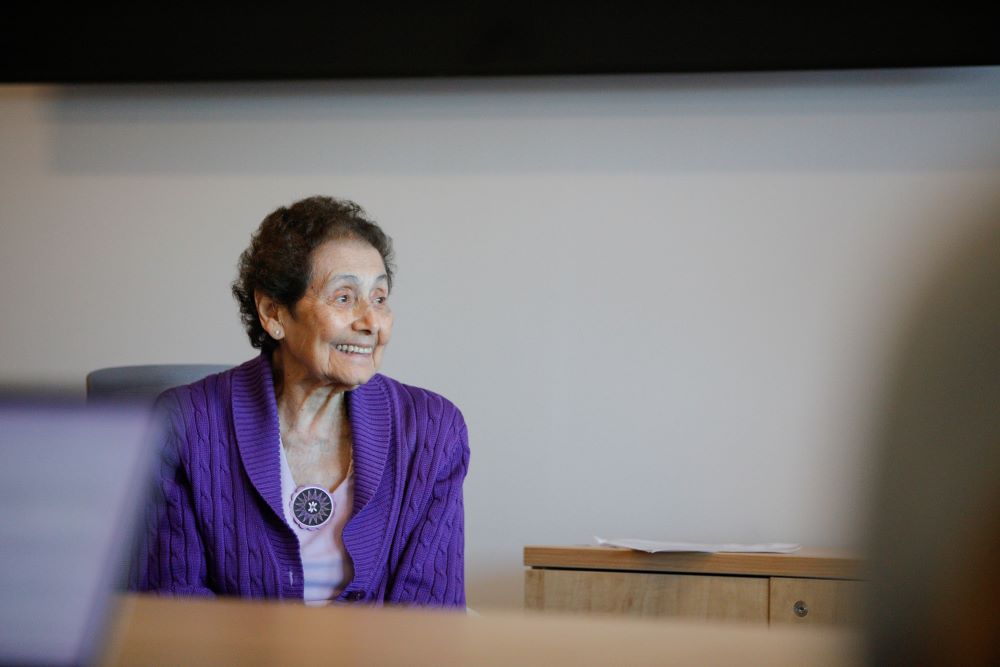Mary-Therese Dombeck’s Timeless Influence on Nursing
By Robin Flanigan
Tuesday, May 21, 2024

Mary-Therese Dombeck, PhD, DMin., LMFT, LMHC, taught full-time at the University of Rochester School of Nursing until 2021 — when she was 85. But the beloved teacher, colleague, researcher, and mentor still hasn’t retired completely.
The now 89-year-old professor emeritus of nursing, who has served under five deans, says she can’t imagine life without working part-time where she has been affiliated since the mid-1970s. “I feel like I grew up there,” says Dombeck, who earned a master’s degree in psychiatric and adult mental health nursing of adults at the School of Nursing in 1978. “It’s like my home.” Dombeck joined the faculty in 1979 as senior associate in nursing and went on to become professor of nursing. She has served on every committee since and chaired several.
Her scholarly endeavors on ethnography and hermeneutics combine social anthropology and theology — she has degrees in both disciplines — and have been published in national and international peer-reviewed research and clinical journals. Since 1980, she has taught an expansive array of courses —including psychiatric nursing, group and family psychotherapy, cultural diversity, and spiritual issues in health care, among others — and developed most of them. Dombeck’s academic work has been featured in more than 30 publications, and she has presented nationally and internationally on the study of dreams, gender identity in nursing, and religious and spiritual needs in health care.
“I think of Mary as a lifelong MasterClass,” says Professor Emeritus of Nursing Tobie Olsan, PhD, RN, CNL, FNAP, who met Dombeck in graduate school and has worked alongside her in multiple capacities since. Yet “despite her high intellect and sophisticated understanding of systems, she’s always humble and kind.” When asked how she feels about the seminal work that has resulted from fusing nursing and spirituality, Dombeck says: “I’ve never thought about it like that. I was just following my own path.” It’s a path that leads back to her childhood.
At the time Dombeck was born in Cairo, Egypt, most women there lost children because of exceptionally poor health conditions. Dombeck says she watched her mother, Esther, successfully raise four children using scrupulously clean cooking methods that were difficult to duplicate. She considered her mother to be endowed with the capabilities of a good nurse. Another formative memory involved Esther taking her to their church sanctuary on Sundays for a short prayer, freshly baked bread in hand, before distributing the bread to poor sections of the city.
“I can't imagine what I would have been without those experiences,” Dombeck recalls. “I wanted to be like my mother. She was indomitable, yet always very kind.”
Holly Brown, DNP, RN, PMHNP-BC, PMHCS, executive director of the Golisano Institute for Developmental Disability Nursing at St. John Fisher University, has some adjectives of her own to describe her former School of Nursing teacher and colleague.
“Mary is patient, reflective, curious, and constant,” Brown says. “She has the ability to bring really dense, really complicated concepts down to a usable level for the average person.” Olsan recalls Dombeck using pragmatic language to move her from the “quantitative realm,” which she felt comfortable in, to more conceptual places, gently quelling her anxiety in the process. “Mary hands-down makes doctoral study and learning a safe space to be,” Olsan says. “We talk about ‘safe spaces’ now; she invented that. And her pearls of wisdom just sort of stick with you and help you beyond the date of your graduation — invaluable.” Pragmatic doesn’t mean basic, however. Dombeck is known for engaging others on a deeper, more meaningful level. “I don’t do small talk,” she says. “If we’re going to talk, let’s talk.”
In fact, she was talking about diversity long before it became a cultural conversation. As a result, two awards are named after her: the Mary Dombeck Diversity Enhancement Faculty Award and the Mary Dombeck Diversity Enhancement Staff Award. Dombeck has received numerous awards herself throughout her career, including the School of Nursing’s Culture Diversity Advancement Award. With experience comes perspective, and one of the occupational shifts Dombeck has been most appreciative of over the years is the increase both in male nurses and those from different ethnic backgrounds. “It’s not just white women anymore,” she says, “and that’s for the best because we’re more like the people we serve.”
To get even more in touch with those people, in 2014 Dombeck formed a spirituality subcommittee within the Council for Diversity and Inclusion to focus on how spiritual, religious, and moral beliefs, relate to the perception of health, illness, healing, suffering, and dying. In addition to being the founding owner of Crossbridge Counseling, Dombeck has been known as the School of Nursing’s “unofficial chaplain” for decades, presiding at memorial services and offering prayers at graduation and other events.
Now that she teaches only two psychotherapy courses at the School of Nursing, Dombeck has more time for resting, ballroom dance lessons, get-togethers with family and friends, and facilitating dream interpreting groups. (Her aunt was a well-known dream interpreter in Egypt.)
“It is a happy balance so far,” she says. “I will continue to evaluate when it is time to stop working year by year.” Those who know her have a difficult time picturing the School of Nursing without Dombeck, whose name is rarely uttered without a trailing list of glowing attributes.
“Mary is present, wise, aware, constant, unflappable,” Brown says. “That woman is like Yoda — for real.” Adds Olsan: “I’ve often thought of Mary as my spirit guide.”

